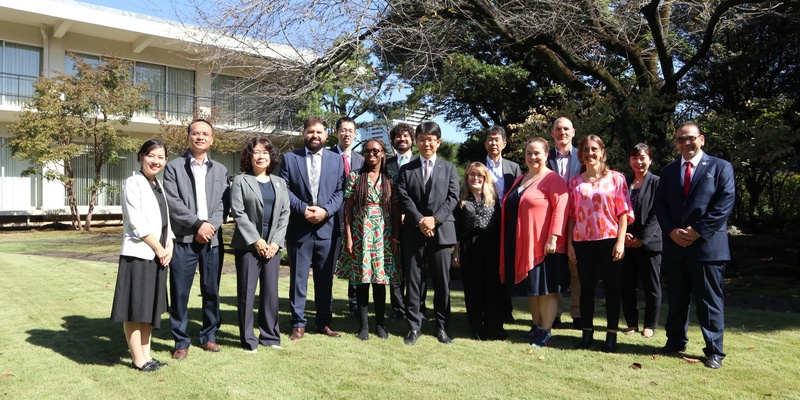SPOTLIGHT: Empowering plant health: guidelines for field inspection
Posted on Fri, 02 Feb 2024, 13:34

© Ministry of Agriculture, Forestry and Fisheries (MAFF) of Japan
Members of the Expert Working Group on Field Inspection, representatives of host country, IPPC Secretariat, Standards Committee (SC) and Implementation and Capacity Development Committee (IC)
For decades, plant pests have been persistent adversaries of agriculture worldwide, posing threats to plant health, food security, and livelihoods. Today, with climate change and the increased global movement of people and goods, pests are spreading faster and farther, a challenge that demands strategic intervention. In response, the International Plant Protection Convention (IPPC) Secretariat has convened an Expert Working Group (EWG) in Tokyo, Japan, to draft an annex to ISPM 23 (Guidelines for inspection) specifically focusing on field inspection.
The EWG meeting, held from the 16 - 20 October 2023, saw the collaboration of experts from diverse back-grounds, including representatives from the host country, the IPPC Secretariat, the Standards Committee (SC) and the Implementation and Capacity Development Committee (IC). The goal of the annex is to describe the concept, objectives, and process of field inspection and provide national plant protection organizations (NPPOs) with the requirements needed to carry out field inspections for conformity with phytosanitary requirements
Addressing unharmonized field inspection practices
Although some International Standards for Phytosanitary Measures (ISPMs) like ISPM 10 (Requirements for the establishment of pest free places of production and pest free production sites), ISPM 12 (Phytosanitary certificates), ISPM 20 (Guidelines for a phytosanitary import regulatory system), ISPM 36 (Integrated measures for plants for planting) and ISPM 38 (International movement of seeds)) describe field inspection, they do not provide any guidance focusing specifically on field inspection. This has resulted in unharmonized implementation of field inspection practices across countries. To bridge this gap, the EWG embarked on drafting an annex that offers clarity on the concept, objectives, and process of field inspection.
The annex aims to provide a standardized approach for NPPOs conducting field inspections, whether as standalone measures or as part of a broader systems approach. It outlines the circumstances justifying phytosanitary import requirements for field inspection, inspection methods based on pest characteristics, the equivalent measures to field inspection more suitable in some circumstances and the responsibilities of NPPOs.
Empowering countries with clear protocols
The lack of specific guidance on field inspection has often led to confusion regarding its objectives and differences from specific surveillance. The annex will help to ensure a clear understanding of field inspection, supporting countries in its appropriate interpretation and application.
Outcomes and next steps
The draft annex will undergo review and approval by the Standards Committee (SC), setting the stage for consultation by contracting parties and Regional Plant Protection Organizations (RPPOs). The eventual implementation of the annex is expected to facilitate harmonization, strengthen international collaboration, and contribute to global trade enhancement.
"This draft provides a much-needed roadmap for countries to conduct field inspections with precision, ensuring a standardized, efficient, and globally accepted approach," said Masahiro Sai, the steward for this annex.
The full meeting report of the EWG is accessible here.
The IPPC, through this Expert Working Group, demonstrates its commitment to addressing crucial gaps in global phytosanitary practices. The upcoming annex to ISPM 23 aims to empower NPPOs worldwide, adopting a unified front against plant pests and ensuring the safety and security of international trade in plants and plant products.

